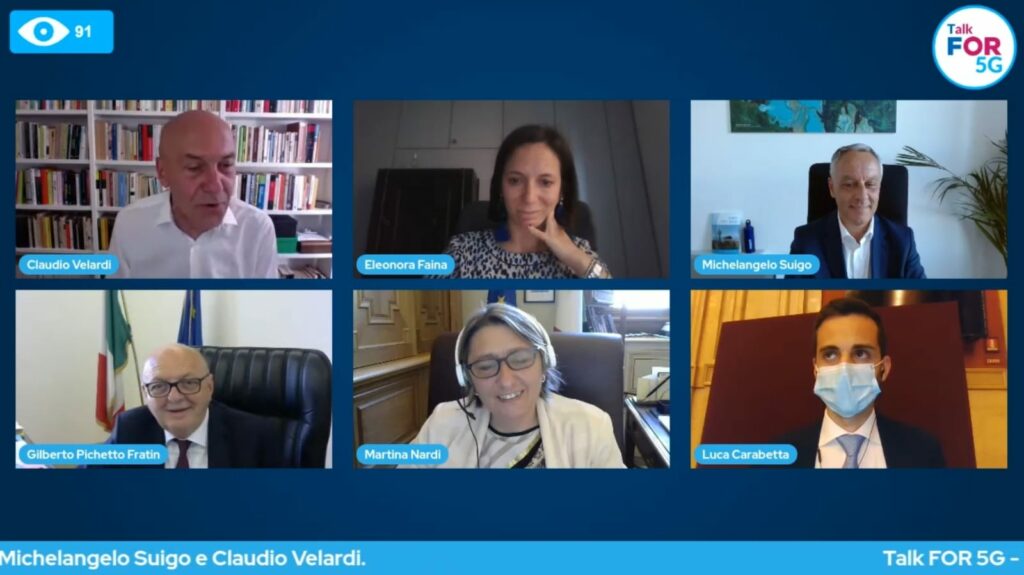Industry 4.0 and 5G: “We are in a crucial phase”

The topic of the latest Talk for 5G event organised by INWIT and Fondazione Ottimisti Razionali was how 5G can be an added value for Industry 4.0.
A new appointment with the Talk for 5G webinars organised by INWIT and Fondazione Ottimisti Razionali. During the online event on 26 May 2021 with the title: “Industria 4.0: la rivoluzione corre con il 5G” (Industry 4.1: accelerating the revolution with 5G), the Deputy Minister of the Ministry of Economic Development, Gilberto Pichetto Fratin, the Member of Parliament (MP) Martina Nardi, MP Luca Carabetta and Michelangelo Suigo, INWIT External Relations and Communications Director, with Claudio Velardi moderating, discussed how 5G will be able to be an added value for Industry 4.0 and how it will effect both the organization of work and production cycles.
With the arrival of the New Normal in cities throughout the world and in work contexts, in the post-pandemic period companies will have to change and necessarily make reference to the technology introduced by the 5G networks in order to make connections more rapid, improve security and create a real 4.0 ecosystem. “We’re in a crucial phase; we have to focus all our efforts towards digital acceleration, together with simplifications and security in the use of data in order to have a more connected, sustainable and competitive Italy. The huge resources of the NRRP (National Recovery and Resilience Plan) for digitalization represent a unique opportunity which must be exploited in the best way possible. 5G technology will be a powerful driver of Industry 4.0 in terms of automation and digitalization”, affirmed Michelangelo Suigo, INWIT External Relations Director.
The 5G technological revolution
The Deputy Minister of Economic Development, Gilberto Pichetto Fratin, is certain that the development of different business models from the ones we currently know could generate vertical growth: “Such a huge quantity of data will have to be managed in a secure way with particular attention on the origin of the new technological tools, as these technologies may include components able to perform functions aimed at sharing information on strategic assets. The collection of information on the part of third-parties or, even of third countries, could put national security at risk. A key aspect will be establishing the rules for the introduction into the Italian market of foreign manufacturers; with regards to the networks, a context supported by tools developed at European Community level is preferred.” The “Simplification” Decree should be the first tool that effectively enables the transition in a structural way: “The institutions have the obligation to govern the economy with rapidity and clarity; to do this, certain timeframes for investors are necessary. 5G is a possibility for change for the country but, at the same time, if the transition is managed correctly, it’s also an opportunity to create new jobs and train new professional figures”, Martina Nardi, Chairperson of the Commission on productive activities, trade and tourism declared during the Talk for 5G.
Simplifaction to Progress
According to Luca Carabetta, member of the Commission on productive activities, trade and tourism, a stimulus from the Government through fiscal policy and a programme of simplifications, which doesn’t come to a stop after a single decree, is needed: “Italy needs to have a European approach on the themes of innovation but, at the same time, the institutions cannot passively wait for Europe to make the first move”. Eleonora Faina, Anitec-Assinform Director General, agrees: “The digital market has constantly grown in the last few years, leading to an evolution in a part of the manufacturing sector that now needs technologies. These technologies, in turn, need a network that enables them to perform at their best. 5G is exactly this type of enabling infrastructure that can boost the competitiveness of our production system”.